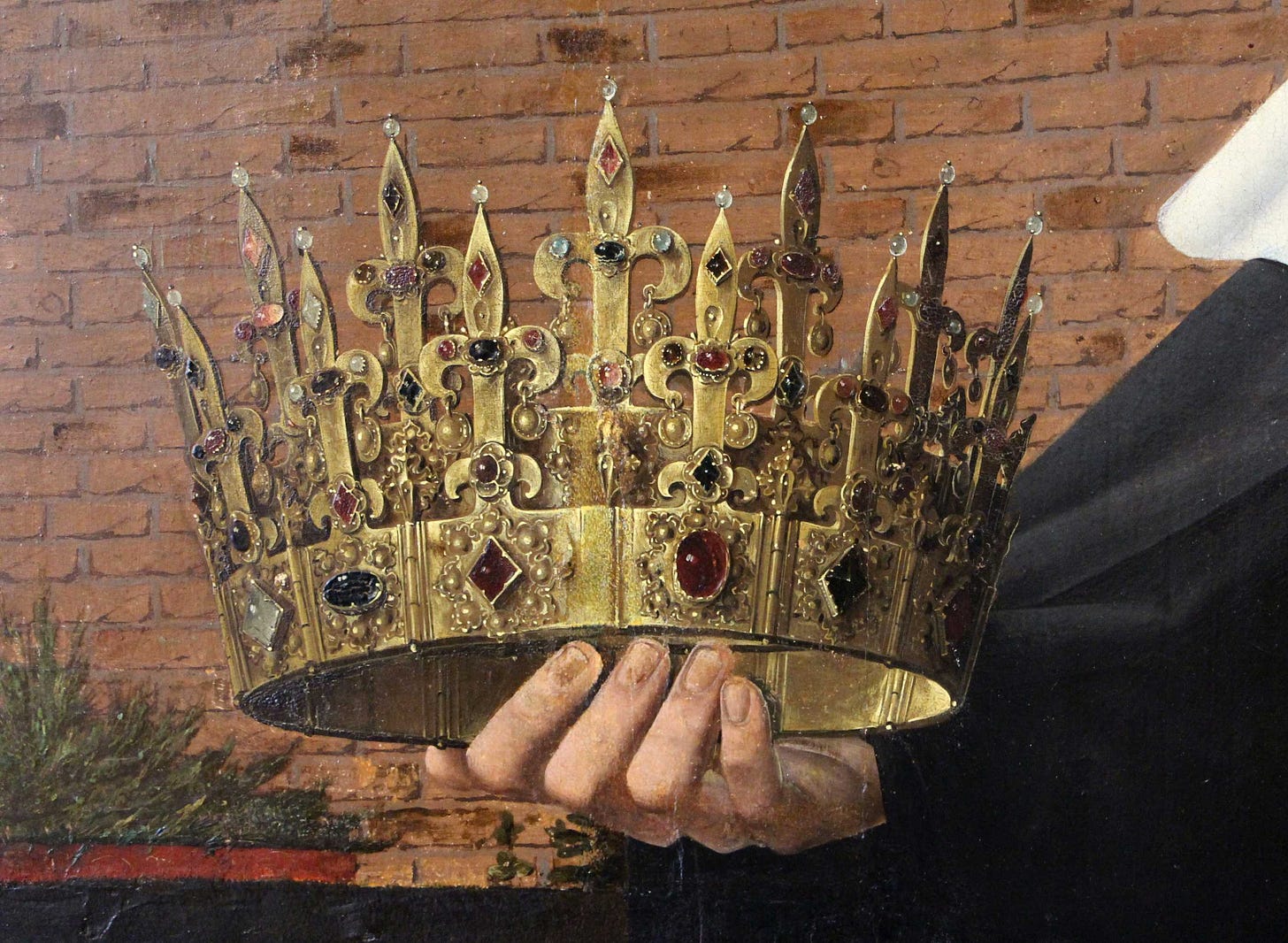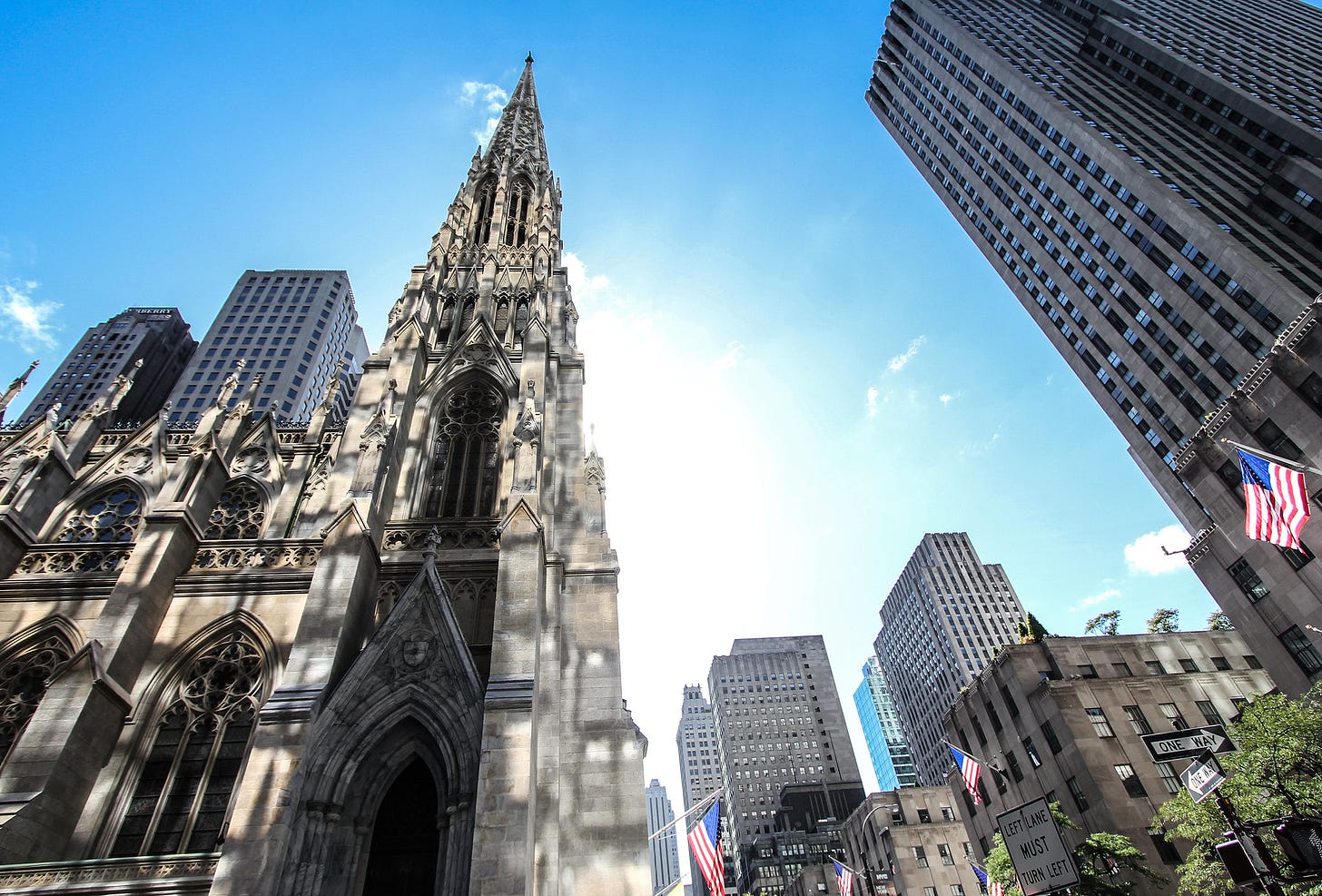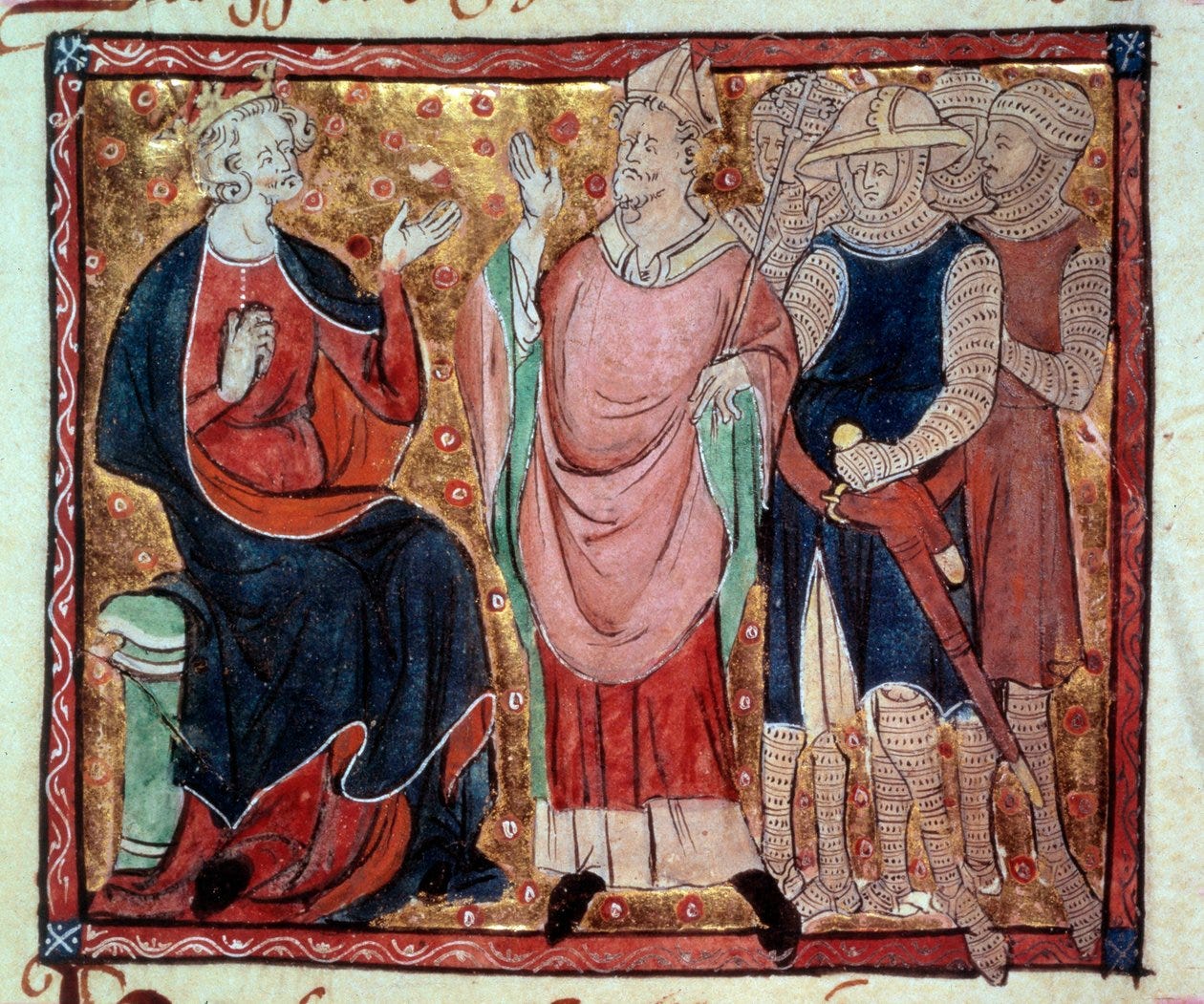The Nine Choirs of Politics
An Overview of Every Possible Relationship between Church and State

G.K. Chesterton was once invited to give an after-dinner speech, but as he stood up to begin, his host passed him a discreet message, asking that he “avoid religion and politics.” He told his hearers what had just happened, then remarked that as far as he was aware, there are no other subjects; and then he promptly sat down again.
He had a point. These two topics treat, respectively, of man’s eternal and his temporal life, and we have no third life to live.
It’s not surprising, then, that the relation of politics and religion is one of perennial interest. In recent years, the question of the attitude that laws, or governments, should adopt toward religion has again been keenly, even heatedly, debated, not least in Catholic circles.
What are the different attitudes that earthly societies may take toward divine truth? We may summarise them under three headings: Opposition, Neutrality, and Welcome.
Of course, this is a simplification. After all, a given society may lack any coherent attitude toward revealed truth. Thus, in my country, there is an established Church whose distinctive statement of faith, the Thirty-Nine Articles, describes the Roman Mass as a blasphemous fable.1 This being the official doctrine of the country, it would make sense for all Catholics priests to be arrested; but fortunately, this is no longer done.
Within each of these three divisions, I propose to set out three different possibilities. We thus shall reach a ninefold division of societies, which may remind us of the nine choirs of the angels, divided as they also are into their three hierarchies.2 Although such a schema remains a simplification, it may perhaps assist thought.

The Attitude of Opposition
Let’s start from the bottom and work our way up.
The lowest hierarchy is the one that I name “Opposition.” It includes three possibilities. Of these three, the first is the worst of all: a society where law and public policy deny the very existence of God. We may give the example of Communist Albania, whose 1976 Constitution declared in article 37: “The state recognizes no religion whatever and supports atheist propaganda for the purpose of inculcating the scientific materialist world outlook in people.”3 Today we still have Communist China.
Second from bottom is a society that is not atheist but officially rejects the divinity of Jesus Christ . An explicitly Islamic state would fall into this category. Of course, in practice, such societies may vary greatly among themselves, not least as regards the freedom enjoyed by Christians, but those distinctions would take us too far afield.
At the top of this bottom division is any society that recognises God and Jesus Christ but explicitly opposes the Catholic Church. An example of this would be England under Henry VIII’s daughter, Elizabeth, where it meant death to say Mass or to harbour a priest.
(St Thomas Aquinas, it is true, tells us that heresy is the worst species of infidelity. From this point of view, a society such as Elizabethan England would find itself at the very bottom of our league table. But what I am considering here is not the degree of guilt or virtue of rulers themselves, but the extent to which revealed truth is incorporated into their realm.)

The Attitude of Neutrality
We move now to our middle hierarchy. This one calls itself, “Neutrality.” On the bottom rung of this comes a society that makes itself officially neutral about all the main doctrines of religion: whether God exists, whether Jesus Christ is the Son of God and Saviour of man, and whether the Catholic Church is His Mystical Body. Modern France, that’s to say, “the Fifth Republic,” will do as an example of this. I choose it because it is close at hand; many other states might of course be named.
Above this, and hence at the very middle point of our ninefold schema come those societies that recognise the existence of God, but are neutral about all else. This is not an unusual compromise. Various states today take such a stance in the preambles to their constitution. Sometimes, it’s true, the wording is too guarded to count as a clear avowal even of God’s existence. For example, article 67 of the Russian constitution, as amended in 2020, honours “the memory of the ancestors who conveyed to us ideals and belief in God,”4 without saying whether this belief was and is correct. The post-World War II German constitution, on the other hand, begins: “Conscious of their responsibility before God and man…the German people have adopted this basic law.”5
It was just such a minimal recognition of religious truth that Pope John Paul II tried (and failed) to induce the rulers of the European Union to place into their “Charter of Fundamental Rights” in the year 2000. “The Church has followed the drafting of this document with keen attention,” observed the Polish Pontiff at the end of that year. He added, sadly: “I cannot conceal my disappointment that in the Charter’s text there is not a single reference to God.”6
On top of the second division would be a society that recognises God and Christ but is neutral about the identity, if any, of the true Church. This is the position implied by the Irish constitution, adopted in 1937 and still in force. It begins magnificently: “In the Name of the Most Holy Trinity, from Whom is all authority and to Whom, as our final end, all actions both of men and States must be referred, we, the people of Éire, humbly acknowledging all our obligations to our Divine Lord, Jesus Christ…”
However, even in its original form, and by the will of Eamon de Valera himself, the Republic of Ireland did not recognise the Catholic Church as the true Church. Its constitution simply acknowledged that, as a matter of fact, Catholicism was the religion to which a great majority of the citizens adhered. This inoperative reference to the “special position” of the Catholic Church in Ireland was itself removed in 1973.
Now, neutrality of one kind or another may be the best that can be achieved in given circumstances. Statesmen themselves must judge this, according to such wisdom as they may possess. Shown the final draft of the Irish Constitution, the Vatican’s Secretary of State, Cardinal Pacelli, later Pope Pius XII, famously remarked: “We do not approve, neither do we disapprove; We shall maintain silence.”
If, by some fluke, a majority of the members sitting in the Parliament of the United Kingdom after the next election turned out to be Catholics, while the general religious composition of the country remained otherwise unchanged, I would not think it wise for them immediately to declare the realm to be a Catholic polity once more. That would be likely to cause a reaction that would leave the Faith worse off than it had been before.
What statesmen may not do, however, is to declare neutrality to be desirable in principle.
Why not? The most important reason is that God, as infinite Truth and Justice, can be said to have rights that must be observed; Jesus Christ has rights that must be acknowledged and abided by. These rights, as many popes have eloquently insisted, concern human beings not only as individuals, but also as organised into societies according to natural law. As Pope Pius XI insisted, exactly one hundred years ago, when instituting the feast of Christ the King: “It would be a shameful error to deny to Christ, as man, authority over civil affairs of every kind, since He receives from the Father such an absolute right over creatures that all things are in His power.”7
Hence, a society that is officially neutral about the existence of God is acting unjustly towards the Creator by not giving to Him the recognition that He deserves. He Himself is the founder of human societies by various titles, not least by having created men as social beings. A society that does not recognise Jesus Christ as Saviour is acting unjustly towards Him, because “He is the source of both private and public salvation” (Quas primas, 18). Even a society that claims to recognise Him but refuses to recognise His Church is truncating Our Lord’s rights, since, as St Thomas Aquinas remarks: “Christ and the Church are one mystical person.”8
There is a supplementary reason why neutrality can never be the ideal. It is, strictly speaking, impossible. “The one that is not with me, is against me,” says Christ the Lord. As Thomas Pink has argued, building on Suárez and on Aristotle, law is necessarily educative.9 By prohibiting certain forms of behaviour, societies are inculcating moral principles; they are teaching the citizens that certain actions are good and that others are bad, and, moreover, that they can be known to be such.
So, what message would be taught by endorsing religious neutrality in principle? Quite simply that no religion can be known to be true, and hence that God has not provided mankind with an adequate way of worshipping Him. This would in turn imply that He lacks either wisdom or power; in other words, that He does not exist. No wonder that Leo XIII predicted that if the civil power put all religions on an equal footing, this could only lead to atheism in the end.10

The Attitude of Welcome
Catholic statesmen, therefore, should desire their countries to ascend to the first hierarchy, that of Welcome. A healthy human society welcomes the word of God. But here again, we may sketch three levels.
On the first (lowest) rung of this uppermost hierarchy will be a society that recognises the truth of the Catholic faith and consequently offers some assistance to the mission of the Church. An example of this might be Malta. Article 2 of the Maltese constitution not only recognises “the Roman Catholic Apostolic Religion” as the religion of the country, and acknowledges that “the authorities of the Roman Catholic Apostolic Church have the duty and the right to teach which principles are right and which are wrong,” but also undertakes to provide instruction in this faith in all public schools as part of compulsory education.11
Need we look higher than this? If Catholics always acted well, this rung might suffice. At times, however, delinquent members of the faithful have to be disciplined. Nor does the Church believe that she is limited to spiritual penalties, such as excommunication. Rather, as the current Code of Canon Law declares, she has the right to establish penalties “which deprive a member of Christ’s faithful of some spiritual or temporal good” (can. 1312.2). Delinquent clerics, for example, may be confined to monasteries, thus losing at least for a while the temporal good of freedom. In principle, there is no reason why a delinquent Catholic politician—for example, one who had voted for a right to euthanasia—might not be similarly penalised, or again, deprived of the right to stand for re-election.
But who would enforce such penalties? Who, for example, would escort an escaped politician back into the cloister? Clearly, the civil power would have to give its consent. So, on the penultimate rung of our whole hierarchy will be a society where the civil power undertakes to enforce the decision of the bishops over their proper subjects (naturally, they would not thereby make any promise to co-operate with flagrant abuses of episcopal power). To this extent, the civil power would thus become, to use the hallowed phrase, the “secular arm” of the Church.12
At least as far as words go, the concordat signed between the Dominican Republic and the Holy See in 1954 corresponds to this arrangement. Its very first article recognises not only “the holy Roman Catholic and apostolic Religion [a]s the religion of the Dominican Republic,” but adds that it “shall enjoy the rights and prerogatives due to it under divine and canon law.”
There remains one final rung. This is when citizenship itself and baptism are co-extensive. Leo XIII, following a long tradition, explains that there are two powers that govern mankind, the spiritual and the temporal, and that there exists between them “a certain orderly connection, which may be compared to the union of the soul and body in man.”13 Now, there is no part of man’s body that is not informed by his soul. Likewise, the most perfect condition of society is when all its temporal power, from law-making to voting, depends on union with the apostolic hierarchy. The glowing example of this, of course, was medieval Christendom.
What is the difference between this rung and the preceding one? It’s like the difference between acting with one’s own arm and with a prosthetic limb. In the second degree, the civil power remains external to the Church, though co-operating with her. In the first, the Church, as befits a perfect society, has this civil power as a part of herself (which does not imply, of course, that it is wielded by the clergy). Who can deny that it is better to have a natural limb rather than an artificial one?
Yet, this does not mean that one may justly aim at this highest degree by any and all means possible. We have already seen that Catholic statesmen must be guided by political prudence, and prudence, in its true sense, means looking toward what is just. For example, it would never be just to remove from citizens their citizenship, or their right to transmit it to their offspring, simply on the grounds that they are unbaptised, since baptism may not be coerced.
But if ever a time comes, perhaps after some social cataclysm, where Catholics are reconstituting some society and are an obvious majority, this would be society’s most perfect form.
Some writers argue that this condemnation is not directed against the Mass as such, and is not incompatible with any doctrines that Catholics are bound to hold. I think that they are wrong, but that is a question for another time.
As we shall see, only the final three polities may be called angelic even by analogy, for the first six have something about them that is either directly demonic or else offers a foot-hold (claw-hold?) to the demon.
https://bjoerna.dk/dokumentation/Albanian-Constitution-1976.htm
https://rm.coe.int/constitution-of-the-russian-federation-en/1680a1a237
https://www.btg-bestellservice.de/pdf/80201000.pdf
Pope John Paul II, Message on the occasion of the 1,200th Anniversary of the Imperial Coronation of Charlemagne by Leo III; https://www.vatican.va/content/john-paul-ii/en/speeches/2000/oct-dec/documents/hf_jp-ii_spe_20001216_javierre-ortas.html
Quas primas, 17. The English translation on the Vatican’s web-site is not entirely satisfactory.
Commentary on the Epistle to the Colossians, ch. 1, lect. 6.
See, for example, “Suarez on Authority as Coercive Teacher,” available online at https://www.academia.edu/38133827/Suarez_on_Authority_as_Coercive_Teacher.
Immortale Dei, 31.
https://riformakostituzzjonali.gov.mt/wp-content/uploads/2019/07/THE-MALTESE-CONSTITUTION.pdf.
The phrase is used in the 1917 code of canon law: “The ecclesiastical authority can resort to the help of the secular arm, if this is deemed necessary or opportune” (can. 2198).
Immortale Dei, 14.




Dr. K: I know it is a lot of work to record the voice versions of these, but it is much-appreciated. there are times when I need to be doing something else (such as washing he dishes) and/or my brain is at capacity for reading. So thank you for this valuable service.
How fascinating it is to hear of the countries with admirably Catholic principles. And how delightful it is to read Fr. Crean’s work in the midst of a semester studying under his instruction!